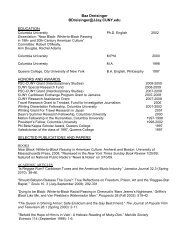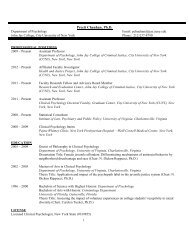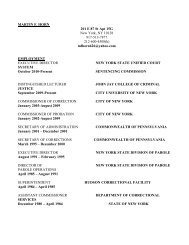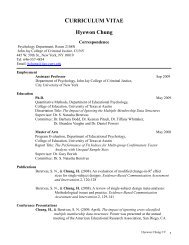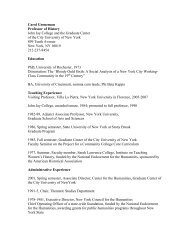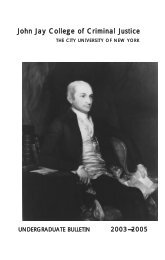Bulletin - John Jay College Of Criminal Justice - CUNY
Bulletin - John Jay College Of Criminal Justice - CUNY
Bulletin - John Jay College Of Criminal Justice - CUNY
You also want an ePaper? Increase the reach of your titles
YUMPU automatically turns print PDFs into web optimized ePapers that Google loves.
Courses <strong>Of</strong>fered<br />
HIS 202 American Civilization – From 1865 to the<br />
Present<br />
3 hours, 3 credits<br />
A history of the United States. Several problems or issues are chosen<br />
each term, and the insights of various disciplines — political science,<br />
sociology, literary criticism, economics, etc. — are brought to bear<br />
on them. Either course, HIS 201 or HIS 202, may be taken<br />
independently.<br />
Prerequisites: ENG 101 and sophomore standing or above<br />
HIS 203 Global History: Prehistory to 500 CE<br />
3 hours, 3 credits<br />
This course introduces students to critical themes and events in global<br />
history that occurred before 500CE. Students consider the major<br />
religious movements of the period, the changing meanings of<br />
civilization and empire, the emergence of evidence-based thought<br />
and systematized reason as alternatives to faith, and the defining<br />
cultural collisions and interactions of this long historical epoch.<br />
Civilizations and locations covered include Egypt, Mesopotamia,<br />
sub-Saharan Africa, India, China, and Europe. Students are examined<br />
on all readings either through quizzes or written assignments.<br />
Primary and secondary sources are assigned for class discussion,<br />
written exercises, and examinations.<br />
Note: this course fulfills one of the General Education<br />
requirements in History<br />
Prerequisite or co-requisite: ENG 201<br />
HIS 204 Global History: 500-1650<br />
3 hours, 3 credits<br />
This course introduces students to the global events, intellectual<br />
preoccupations, and institutions that defined the historical period<br />
between 500 and 1650. Geographic coverage includes Africa, India,<br />
China, Europe, and the Americas; topics covered include Islam,<br />
Catholicism, the Reformation, the roots of nation-states as political<br />
units, the growth of market economies, colonialism, and competing<br />
ways for making sense of the world. Students are examined on all<br />
readings either through quizzes or written assignments. Primary and<br />
secondary sources are assigned for class discussion, written exercises,<br />
and examinations.<br />
Note: this course fulfills one of the General Education<br />
requirements in History<br />
Prerequisite or co-requisite: ENG 201<br />
HIS 205 Global History: 1650 - Present<br />
3 hours, 3 credits<br />
By examining events in Africa, Asia, Europe, and the Americas, this<br />
course explores the major historical processes that shaped the modern<br />
world, including industrialization, the rise of the nation- state, war,<br />
colonialism and anti-colonialism, and accelerating global contacts<br />
among peoples. The course considers how a globalized world<br />
dominated by a few industrialized nations arose, as well as how new<br />
and often competing ways of understanding the world took root.<br />
Students are examined on all readings either through quizzes or<br />
written assignments. Primary and secondary sources are assigned for<br />
class discussion, written exercises, and examinations.<br />
Note: this course fulfills one of the General Education<br />
requirements in History<br />
Prerequisite or co-requisite: ENG 201<br />
HIS 206 Orchestral Music and the World Wars<br />
(Same course as MUS 206)<br />
3 hours, 3 credits<br />
This course will explore how World Wars I and II changed the role of<br />
music and musicians in Western European society, as well as the<br />
sound of music itself. Within the time frame of 1900 – 1945, this<br />
course will examine the effects of the World Wars on the evolution of<br />
Western European Classical Music. By analyzing the influence of<br />
Russian and European politics on musical expression, this course<br />
raises questions: How did Stalin and Hitler influence musical style<br />
88



